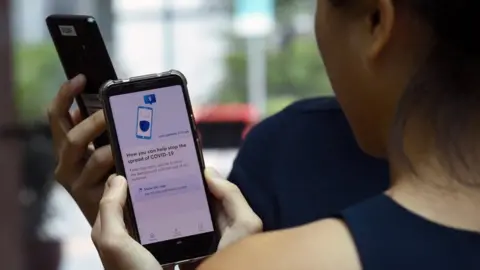Covid-19: Singapore woman jailed for hiding meetings with male friend
 AFP
AFPA woman in Singapore who concealed her meetings with a male friend from coronavirus contact tracing has been sentenced to five months in prison.
Oh Bee Hiok, 65, was worried her family would think she was having an affair if she disclosed the meet-ups.
Officials discovered the outings after reviewing CCTV and other material.
Singapore uses strict measures to try to keep infections in check. It has recorded 29 deaths and comparatively few cases.
Mrs Oh met up with 72-year-old Lim Kiang Hong five times before she tested positive for Covid-19 in February.
The pair would meet for lunch, dinner or tea when Mrs Oh's husband was out playing badminton, a prosecutor in the case said, according to the Straits Times.
"She did not want her family or Lim's family to find out that they were going out so frequently, as she thought that their family and friends would suspect that they were in a romantic relationship and spread rumours about them being in an extra-marital affair," court documents said.
When she was admitted to hospital, Mrs Oh spoke to her friend on the phone and asked him to keep their outings secret.
Mr Lim then tested positive for coronavirus in March.
A lawyer for Mrs Oh said that she had not infected her friend with the virus.
Using parking records, credit card statements, call records and CCTV, authorities were able to discover the meetings between the pair.
The judge in the case called Mrs Oh's reasons for concealing the outings "selfish... within the pressing public interest need to control the pandemic", according to broadcaster CNA, quoted by AFP news agency.
During the ruling on Friday, he added that the court needed to send a message that hiding information from contact tracers was "totally unacceptable".
Mrs Oh pleaded guilty to the charge of hindering contact tracing efforts.
In spring 2020, Singapore largely managed to control the spread of coronavirus before a large cluster of cases spread in the dormitories of migrant workers.
The city has reported nearly 60,000 infections.
